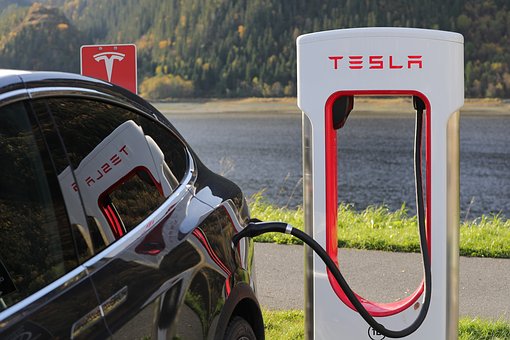Electric vehicles

|
| Tesla's Model X electric car has a 100kWh battery that provides a range of 351 miles. |
Contents |
[edit] Introduction
Electric vehicles (EVs) are typically cars, although they can be motorcycles, trains, buses, trams, trucks, aircraft, ships, submarines and other vehicle types. They may have one or more motors powered by electric batteries, as opposed to an internal combustion engine.
[edit] Benefits and drawbacks
Compared to petrol-driven varieties, electric vehicles tend to be quieter, cheaper to run and have no exhaust emissions, however the carbon footprint will depend on how the electricity driving the vehicle has been generated. Electricity derived from wind, tidal and solar has a better carbon footprint than that generated from fossil fuels.
Potential drawbacks of EVs include relatively high purchase costs, limited choice of models, battery life and replacement costs, and lower range compared to petrol-driven vehicles.
[edit] Charging methods
Batteries can be recharged either by off-vehicle electricity sources or integrated sources such as solar panels and fuel cells. Lithium-ion (Li-Ion) batteries are generally the predominant type used for EVs as they are longer lasting and have a higher energy- and power-density than most other battery types. Li-Ions have superceded the earlier and pricier nickel metal hydride batteries due to the latter’s tendency to lose charge in heat.
Cars recharged from external electricity sources are known as plug-in electric vehicles (PEVs), with the Nissan Leaf being the world’s top-selling model (2018). Cars that combine conventional fuel-powered engines with electric propulsion are known as hybrid electric vehicles (HEVs), a market dominated by Japan followed by the US and Europe.
In the UK, the 12 months to December 2018 saw a dramatic slowdown in sales of electric cars which is undermining government plans to cut roadside emissions. This is attributed to factors, including public scepticism over safety issues, a lack of charging points, few affordable models, cuts in green car incentives by the UK government and sluggish progress in EV roll-out.
[edit] Automated vehicles
EV technology lends itself more readily to automation than conventional technology and this has generated much interest in autonomous vehicles (AVs). There are varying levels of automation for road vehicles: fully autonomous, where the AV can complete journeys safely without a driver in normally-encountered traffic conditions, and highly automated, where the vehicle can operate in driverless mode but must have a driver on-board to take control if necessary.
AVs will potentially transform cities due to zero exhaust emissions, safer roads, fewer accidents, less congestion and smoother traffic flow, with extensive freeing-up of conventional parking space. It could also bring about changes in car ownership patterns and raise questions in terms of insurance. If an accident occurs with a fully autonomous vehicle, who is responsible? The vehicle provider, the manufacturer or the software developer?
[edit] Progress
In July 2019, the government launched a consultation on proposals to alter existing residential and non-residential buildings regulations to include electric vehicle infrastructure requirements. Ref https://www.gov.uk/government/consultations/electric-vehicle-chargepoints-in-residential-and-non-residential-buildings
NB Making Mission Possible - Delivering A Net-Zero Economy, published by the Energy Transitions Commission (ETC) in September 2020, suggests a fuel cell electric vehicle (FCEV) is an: ‘Electric vehicle using a fuel cell generating electricity to power the motor, generally using oxygen from the air and compressed hydrogen.’
[edit] Related articles on Designing Buildings
- Autonomous vehicles.
- Battery electric vehicle.
- Boosting electric vehicle use.
- Drivers uncertain over electric vehicles.
- ECA and UKPN launch EV guide.
- ECA backs joint rail electrification statement.
- ECA calls for urgent energy price reform.
- ECA warns lack of EV strategy could leave UK divided.
- Electric car charging stations - what you need to know.
- Electric vehicles in 2021.
- Electricity.
- Fuel.
- Fuel cells.
- Hybrid electric vehicle.
- Hydrogen fuel cell electric vehicle.
- Key notes on electric car charging points.
- London car charging infrastructure.
- New style EV charging stations.
- Opportunities for EV charging.
- Pop-up electric vehicle charge points.
- Transport Decarbonisation Plan.
- Two thirds of local authorities have no plans to install EV chargers.
- Vehicle to grid.
- Zero-emissions vehicles.
Featured articles and news
Apprenticeships and the responsibility we share
Perspectives from the CIOB President as National Apprentice Week comes to a close.
The first line of defence against rain, wind and snow.
Building Safety recap January, 2026
What we missed at the end of last year, and at the start of this...
National Apprenticeship Week 2026, 9-15 Feb
Shining a light on the positive impacts for businesses, their apprentices and the wider economy alike.
Applications and benefits of acoustic flooring
From commercial to retail.
From solid to sprung and ribbed to raised.
Strengthening industry collaboration in Hong Kong
Hong Kong Institute of Construction and The Chartered Institute of Building sign Memorandum of Understanding.
A detailed description from the experts at Cornish Lime.
IHBC planning for growth with corporate plan development
Grow with the Institute by volunteering and CP25 consultation.
Connecting ambition and action for designers and specifiers.
Electrical skills gap deepens as apprenticeship starts fall despite surging demand says ECA.
Built environment bodies deepen joint action on EDI
B.E.Inclusive initiative agree next phase of joint equity, diversity and inclusion (EDI) action plan.
Recognising culture as key to sustainable economic growth
Creative UK Provocation paper: Culture as Growth Infrastructure.
Futurebuild and UK Construction Week London Unite
Creating the UK’s Built Environment Super Event and over 25 other key partnerships.
Welsh and Scottish 2026 elections
Manifestos for the built environment for upcoming same May day elections.
Advancing BIM education with a competency framework
“We don’t need people who can just draw in 3D. We need people who can think in data.”






















Comments